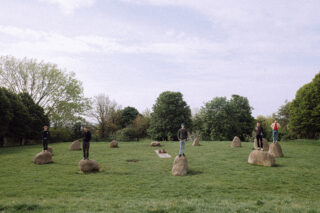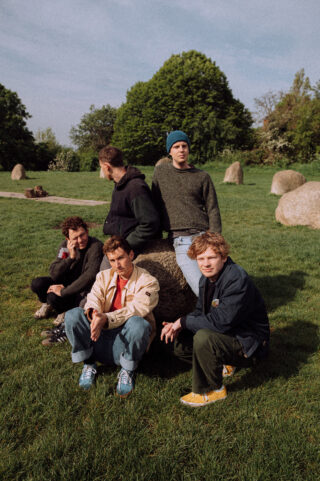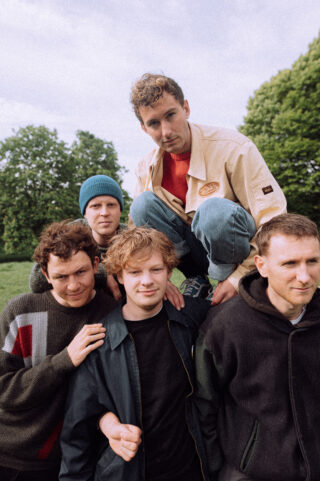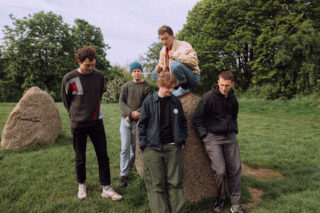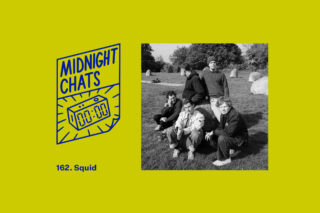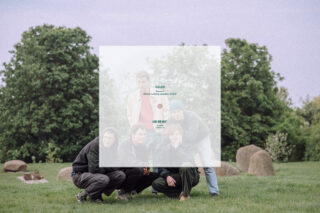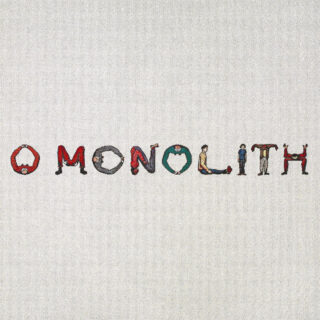On Squid’s second album O Monolith, the band’s avant-garde leanings serve a work of thrilling complexity and emotional range, exploring themes of paranoia and displacement. Presenting more expressive, inventive writing than their debut album Bright Green Field, it also takes place on a grander scale, featuring extra percussionists, woodwind players and a choral ensemble. Whilst Bright Green Field professed to take place within an imagined cityscape, O Monolith sends us hurtling through different settings, as well as far-ranging textures and moods. As guitarist Anton Pearson says self-deprecatingly: “It’s a mess, is what it is!”
Throughout O Monolith, Squid present an unstable relationship with their environment. Settings change dramatically, from a pre-industrial village in ‘Devil’s Den’ to a claustrophobic aeroplane in ‘Green Light’. Vocalist and drummer Ollie Judge imagines the world’s destruction in ‘Swing (In A Dream)’, and looks beyond Earth altogether in ‘After The Flash’: “Staring into the stars.” Guitarist Louis Borlase links this to the band’s “feeling of displacement” amidst the international touring following Bright Green Field. “There were times when it was intense being away, focusing on live music, then coming back and reconnecting with friends and family,” he explains.
At the heart of this shifting environment is a striking interplay between rural and urban imagery, demonstrated in ‘The Blades’ where crowds of people are imagined as blades of grass. Judge ascribes this to O Monolith’s creation at Real World Studios, nestled in rural Wiltshire, immediately after a tour of major cities across the US. “I think that’s the biggest culture shock I’ve ever had going abroad,” he says. “Everything’s amplified, and so in-your-face. Coming back to Wiltshire to record the album, it was like we wanted to be quite British and pastoral.”
Musically, this is reflected in the album’s mixing of cold, industrial electronics with sounds from folk music: woodwind, vocal harmonies and simple, warm guitar arrangements. This contrast is demonstrated by sections of ‘Siphon Song’, where group vocals and folk-facing guitars support a heavily processed lead vocal, singing “plastic in the wind.” Bassist and trumpet player Laurie Nankivell notes Adrian Utley and Will Gregory’s soundtrack to the 2017 film Arcadia as a reference point in this. “In that piece of work, they draw a line between old Pagan folk traditions and modern hedonistic traditions of partying and stuff – I think that influenced the record somewhat.”
This complex presentation of environment forms the basis for striking insights in O Monolith, particularly in the closing track ‘If You Had Seen The Bull’s Swimming Attempts You Would Have Stayed Away’, which explores our relationship with rats. “Wherever there’s large human populations, there’s large rat populations,” explains Pearson, who wrote this song’s lyrics. “I was thinking about that in a British context, and how they probably arrived when the Romans came.”
The others break into a chuckle at this, clearly still bewildered by Pearson’s level of rat-based knowledge, but he presses on with a grin. “There’s grey rats and black rats in the UK: one of them came with the Romans, and the other came with the Normans is what they think. Today, black rats are pretty rare but grey ones are everywhere.”
“It’s interesting that it’s grey squirrels and grey rats that prevailed,” Judge chimes in.
“I think they’re actually called brown rats,” Pearson corrects himself. “It’s interesting that they arrived when the Romans did, because Celtic languages would’ve started to decrease at that point.” This is presented in the fragmented lyrics, which describe the “death of the language.” While this enthusiasm prompts some gentle teasing, with Pearson’s bandmates calling him ‘Rat Boy’ later in our interview, it produces one of the album’s highlights: a towering slow burner, led by chilling whispered vocals.
Feelings of paranoia or fear might not necessarily be evoked by rats, depending on one’s sympathies for them, but certainly loom large throughout O Monolith. ‘Devil’s Den’ presents a witch-trial, while ‘Green Light’ centres upon fears about a plane crashing: “Where is the best place to sit if this all goes wrong?” When asked about this, Judge playfully gestures around the table to his “band of five anxious men.” However, he acknowledges the weight of these feelings in the years around the global pandemic, when O Monolith was being written. “It’s kind of impossible in the years 2020-2023 to not be afraid or paranoid about pretty much everything. I feel like you’re not normal if you’re not anxious,” he grins. “And if you’re not anxious, you’re a liar! Which is bad!”




